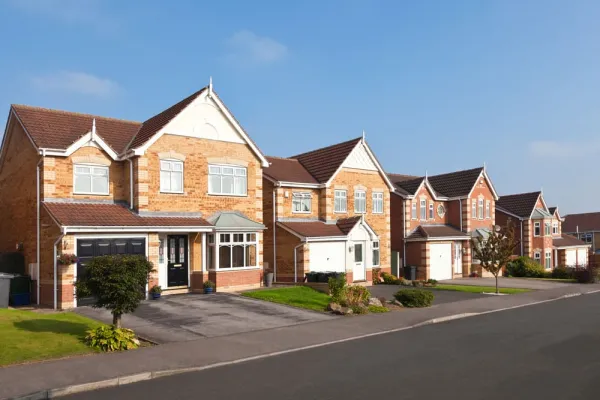In the year ending March 2024, approximately 232,470 new houses were built.
A new-build home is an excellent option for a certain type of house buyer.
However, it has drawbacks that need to be considered, too.
Below, we have provided the ultimate guide to buying a new-build property. Keep reading for everything you need to know.
What is a new-build home?
A new-build home is one that has only been recently constructed, meaning that you will be the first owner. This property has not been lived in by anyone and should therefore be in better condition.
New-build properties are often grouped together on the same estate, but they can also stand alone.
You get them in towns all across the UK – but they are less common in the centre of major cities, where population density is already very high.
Developers are usually the ones that develop new-build properties, as they aim to sell them for a profit.
There may be a marketing campaign surrounding any large estates that are built, encouraging people from the area to purchase one.
Some developers even provide ‘off-plan’ property services that enable you to specify what your house should look like before it’s built. There may be a reservation fee involved.
Who usually buys a new-build home?
In most cases, new-build detached, semi-detached or terraced properties are bought by middle-aged or older people.
This is because first-time buyers often cannot afford this price range and need to buy a flat as their first step onto the housing ladder.
Sometimes, an estate of new-builds will be marketed at a specific demographic. It could be described as a place to retire, or as a location that is ideal for young families (perhaps due to the close proximity of a school).
How to buy a new-build home
New-build homes will be listed on major websites like Zoopla and Rightmove, and developers will usually hire an estate agent (or several) to sell them as quickly as possible.
If you see these properties in-construction, you could always approach the site manager directly and ask for details about when the project will be finished, and if it is possible to enquire about a purchase.
Some of the paperwork and legal processes are the same surrounding purchasing a new-build house – but there can be other, more complicated steps too.
Therefore, it is recommended that you be supported by a conveyancer. They can not only handle these things but also ensure that you aren’t being taken advantage of or forced into restrictive contracts by the developer.
Advantages of purchasing a new-build home
The living costs of a new-build home are typically lower, because it has been constructed to a higher standard.
For example, most new-builds have an EPC rating of ‘A’ or ‘B’, which can reduce your energy bills during the colder months.
Lots of developers enable you to purchase a new-build before it’s built.
This can give you security ahead of time, as you can hopefully guarantee that the deal will go through, and that you’ll be happy with the house.
All new-builds are sold as freehold, meaning that you don’t need to navigate leasehold arguments over the years.
Lots of developers offer incentives to purchase new-builds, which we have explained further below in this article.
Disadvantages of purchasing a new-build home
Some people argue new-build properties lack character.
The ‘lived-in’ aspect of a house can make it seem more homely. This is especially true since most new-builds are in an estate of similar-looking houses.
Secondly, even if you pay for a specific design in advance, the finished version won’t necessarily look exactly how you pictured.
Your mind’s eye can never be replicated entirely, even with in-depth architectural plans, so be prepared for slight variance on your ideas.
New-build properties can often be ‘out of the way’ of city and town centres, because there isn’t enough space for these in the more densely populated areas.
If you are buying a new-build house, it might be better as a long-term option, rather than an investment.
These properties have a track record of declining in value in the first few years, meaning that if you try to sell it quickly, you could make a loss.
Service charges can be high for the shared areas, as private developers are the ones who manage these areas, rather than councils.
Can I get financial support with purchasing a new-build?
Yes, there are plenty of developers around the UK who offer financial incentives to encourage you to buy a new-build. There are also government schemes for helping buyers.
Many developers offer the ‘Part Exchange’ initiative, which means that you can ‘trade in’ your previous home (assuming you owned it) for one of their new-build properties.
This guarantees that the deal will go through and allows you to capitalise on the value of your existing property.
Developers will often offer to cover your Stamp Duty fees, or provide free fixtures and fittings as part of the sale.
The combined cost of furniture is not cheap, so this could save you thousands of pounds.
Can you decorate a new-build house straight away?
Yes, once the house belongs to you, you are free to decorate it however you wish.
Just keep in mind that certain aspects of the house – such as the wallpaper and paint – might not have been in-place for long.
It may be best to leave it for a few months, to make sure you don’t cause damage to aspects that haven’t settled yet.
How much can you negotiate on a new-build house?
New-build developers are often open to negotiation just like any other house sellers.
Indeed, according to research by property tech company Unlatch, new-build home buyers negotiate a typical discount of 14% off the price.
This figure can vary significantly, depending on:
- How in-demand the development is
- How much it cost to construct
- Market conditions
And other factors.
It is always worth approaching them and putting an offer in writing – but don’t be surprised if they are reluctant to drop below their asking price.
Do I have to reserve a new-build house?
If you agree to purchase a new-build house, then you will first need to reserve it. This usually involved a £1,000 payment.
This is not the same thing as your deposit on the property, which is a totally different (and usually much larger) amount.
How long will I have to wait for a new-build bouse to be ready?
It can take a few months to a couple of years, for new-build properties to be completed.
It all depends on the stage at which you first contact the developer, and how efficient they are at getting work moved along.
Do new-build houses come with any protection?
If your new home is registered with the National House Building Council, it will come with a 10-year warranty and protection scheme.
You should confirm this detail before you purchase it, so you aren’t left blindsided.
Work with Sold
These are just some of the parts involved with buying a new build home. If you are in the market for a new home, whether it’s new build or not, speak to the team at the nation’s leading online estate agent.
Sold help you buy and sell property and never charge a penny to get you moving. Contact us today to find out more.
















